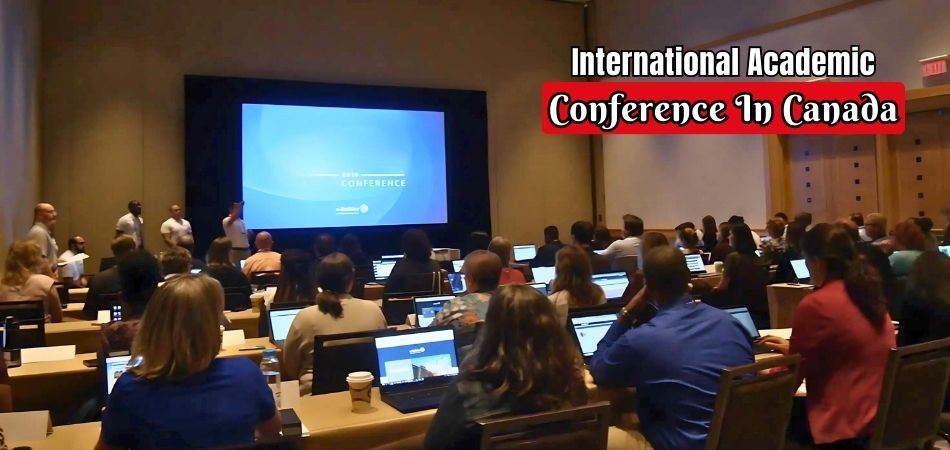In today’s global world, academic conferences held in Canada have grown in significance, drawing scholars and professionals from a wide range of disciplines. These gatherings serve as vibrant hubs for knowledge exchange and collaboration. Now, you might be wondering, “What is the international academic conference in Canada?”
An international academic conference in Canada is a formal event where researchers, educators, and industry experts come together to present their findings, share ideas, and discuss advancements in their fields. These conferences facilitate networking, foster collaboration, and promote innovative research across a diverse range of subjects, making Canada a preferred destination for such events.
Would you like further information regarding the topics covered and the types of attendees at these conferences? This article will provide you with all the essential information you need to understand the landscape of international academic conferences in Canada.
Historical Overview of International Academic Conference in Canada
With a rich tradition of hosting international academic conferences, Canada has established itself as a leading venue for scholars, researchers, and professionals across diverse fields. These conferences have significantly contributed to global academic collaboration by providing a valuable platform for the exchange of ideas and knowledge.
Canada’s solid academic infrastructure keeps drawing a wide variety of international conferences. From humanities to the latest technology, conferences held in Canadian cities offer something for every academic discipline. Universities and research institutions also play an important role in supporting and organizing these conferences, elevating the overall academic experience.
For those interested in attending, it’s worth exploring upcoming international conferences in Canada 2024. These events promise to be dynamic gatherings of experts from around the world, contributing to the latest academic advancements. By participating, attendees can engage with thought leaders and access valuable insights into their areas of expertise.
This tradition of hosting global conferences in Canada has contributed to the country’s growing reputation as a hub for academic excellence. Many participants find these conferences to be essential for staying updated with new research trends and for networking with their international peers.
What is the International Academic Conference in Canada?
The International Academic Conference in Canada serves as a vital gathering for scholars and professionals from diverse fields. It encourages collaboration, knowledge sharing, and innovation. Participants gain invaluable insights into the latest research and trends while building a global network of peers.
Networking Opportunities
One of the key benefits of attending an international academic conference in Canada is the networking opportunities it provides. Participants can connect with scholars, researchers, and industry professionals from around the world. These connections often lead to potential collaborations, partnerships, and academic exchanges, enriching participants’ professional lives and expanding their influence in their respective fields.
Introduction to the Latest Research
Attendees of these conferences gain access to the latest research and developments in their fields. Presentations and discussions often feature groundbreaking studies and innovative ideas that can inspire new research directions. By engaging with this cutting-edge information, participants can enhance their knowledge and stay updated on trends shaping their disciplines.
Opportunities for Publication
Many international academic conferences offer participants the chance to present their research findings. Presenting at such events can significantly enhance an academic’s profile. Furthermore, many conferences have associated journals or proceedings that publish selected papers, providing an excellent avenue for researchers to showcase their work to a broader audience.
Professional Development
Participating in an international academic conference allows attendees to engage in professional development activities. Workshops and seminars often cover essential skills, such as grant writing, publishing strategies, and teaching methodologies. This focus on skill enhancement equips attendees with the tools necessary to advance their careers and contribute meaningfully to their fields.
Diverse Perspectives
The diversity of participants at these conferences contributes to a rich exchange of ideas. Scholars from various backgrounds and cultures share their insights, leading to more comprehensive discussions and innovative solutions to complex problems. This exposure to different perspectives encourages attendees to think critically and embrace new approaches in their research.
Increased Visibility
A researcher’s visibility within their academic community can be greatly increased by attending an international academic conference. By presenting their work and participating in discussions, scholars can showcase their expertise and gain recognition. This visibility can open doors to new opportunities, including invitations to speak at other events or collaborate on projects.
Inspiration and Motivation
Finally, attending these conferences can reignite passion for one’s work. Engaging with peers who share similar interests and challenges can be incredibly motivating. The energy of the event, combined with exposure to innovative ideas, can inspire attendees to pursue new research avenues and recommit to their professional goals.
The International Academic Conference in Canada offers numerous benefits that enhance academic and professional development. By participating, individuals can network, share knowledge, and gain valuable insights that contribute to their success in their respective fields. Attending such conferences is a vital step for anyone looking to grow and thrive in academia.
What Topics Are Covered at an International Academic Conference in Canada?
There are many opportunities to interact with a broad range of topics when you attend an international academic conference in Canada. These conferences attract global professionals, allowing attendees to learn about the latest advancements across various fields. The diversity of subjects ensures there’s something for everyone.
Technology and Innovation
A lot of Canadian academic conferences center around technology and innovation. Researchers present the latest breakthroughs in artificial intelligence, biotechnology, and digital solutions. These sessions often highlight how technology is transforming industries and creating new possibilities for research and application across different sectors.
Environmental and Climate Studies
With the global focus on climate change and environmental sustainability, many Canadian conferences delve into ecological issues. Topics include renewable energy, environmental policies, and strategies to combat climate change. These discussions aim to promote solutions that can address the ongoing challenges faced by ecosystems and the planet.
Health and Medical Advancements
In Canada, research on health is a crucial area of focus for international conferences. Medical experts discuss breakthroughs in treatments, disease prevention, and healthcare technologies. These sessions cover various disciplines, such as mental health, global pandemics, and advancements in medical procedures, offering valuable insights into the future of healthcare.
Social Sciences and Humanities
These academic events feature a strong representation of the humanities and social sciences as well. Topics range from sociology and psychology to history and cultural studies. These discussions often emphasize understanding human behavior, social trends, and cultural evolution, fostering a comprehensive approach to solving complex social issues.
Business and Economic Development
Many conferences focus on the business world and economic development. Topics include global trade, economic growth, and strategies for entrepreneurship. These discussions are essential for professionals who want to stay updated on market trends and new strategies for business development, highlighting the importance of participating in Canadian conference events.
The topics covered at international academic conferences in Canada span a wide range of disciplines, from technology to social sciences. Participating in these events provides attendees with invaluable insights, professional growth, and opportunities to contribute to global discussions on critical subjects.
Types of Attendees Participate International Academic Conference in Canada
A wide range of people attend international academic conferences in Canada, each contributing their own perspectives and areas of expertise to the proceedings. This variety enriches discussions and fosters collaboration among participants. Understanding the different types of attendees can enhance your networking opportunities.
- Researchers: Individuals who conduct studies and publish findings play a crucial role in academic conferences. They present their work and engage with peers, receiving valuable feedback to refine their research.
- Academics and Professors: Experienced educators often attend to share their knowledge and insights. They contribute to discussions and workshops, helping to shape the direction of academic discourse in their fields.
- Graduate and Postgraduate Students: Young scholars are eager to learn and grow in their disciplines. They attend conferences to present their research, gain exposure, and connect with established professionals in their areas.
- Industry Professionals: Many conferences welcome representatives from various industries. These attendees share practical insights and experiences, bridging the gap between academic theory and real-world applications.
- Policy Makers: Individuals involved in shaping educational and research policies participate to understand current academic trends. Their presence helps align academic research with societal needs and government initiatives.
- Sponsors and Exhibitors: Organizations that sponsor or exhibit at conferences are essential for funding and showcasing their products or services. Their involvement supports the event while providing attendees with information about relevant tools and resources.
The diverse types of attendees at international academic conferences in Canada create a vibrant atmosphere for learning and collaboration. Engaging with various professionals can lead to unique insights and opportunities for personal and professional growth.
Tips for Finding the Right International Academic Conference in Canada
Selecting the appropriate international academic conference in Canada can greatly advance your career. With numerous events available, it’s important to select one that aligns with your interests and goals. The following tips can guide you in making an informed choice.
Research Relevant Conferences
Start by identifying conferences that are closely related to your field of study or professional interests. Online academic databases, university websites, and social media platforms are excellent resources for finding events. Make a list of conferences that intrigue you, and consider their themes and topics to ensure they align with your work.
Consider Conference Location and Timing
The location and timing of the conference are essential factors to consider. Choose a conference in a city that interests you and is accessible to attend. Additionally, check the conference dates and ensure they fit your schedule. Avoid conflicts with other commitments to maximize your attendance experience.
Review Past Conferences and Feedback
Look for information about previous conferences organized by the same entity. This includes reviewing attendee feedback, speaker lineups, and overall organization. Understanding how past events were received can help you gauge the quality and relevance of the conference you are considering.
Analyze Networking Opportunities
Conferences are not just about learning; they are also about networking. Assess the opportunities available for connecting with other attendees, speakers, and industry leaders. Events that offer networking sessions, workshops, or social activities can enhance your experience and help you build valuable relationships.
Understand the Application Process
Before committing to a conference, familiarize yourself with the application process for Canadian conferences. This may involve submitting proposals, registering for events, or preparing necessary documents. Understanding these requirements early can help streamline your preparation and increase your chances of being accepted to present or attend.
The right international academic conference in Canada can lead to new opportunities for collaboration, career advancement, and the exchange of ideas. By following these tips, you can make informed decisions that align with your professional aspirations and contribute to your academic journey.
Frequently Asked Questions (FAQs)
International academic conferences in Canada are an exciting opportunity for scholars, professionals, and students to gather and exchange knowledge. To help you better understand these events, here are some frequently asked questions and their answers that will provide clarity on what to expect and how to participate.
How Do International Academic Conferences in Canada Benefit Students?
Students gain valuable experience by attending international academic conferences in Canada. They can present their research, network with experts, and receive feedback from professionals in their field. These events also help students stay updated on the latest trends and potentially open doors for further academic opportunities.
What Types Of Presentations Are Common At These Conferences?
At international academic conferences in Canada, presentations vary from research papers to posters and interactive workshops. Attendees can expect keynote speeches, panel discussions, and roundtables where experts share insights and recent findings, fostering both learning and collaboration among diverse participants.
Can International Attendees Present At Canadian Conferences?
Yes, international attendees are encouraged to present their work at Canadian academic conferences. These conferences are globally recognized, providing a platform for international scholars to share their research, engage with experts from around the world, and expand their academic presence beyond their home country.
What Are The Language Requirements For Canadian Academic Conferences?
Most international academic conferences in Canada are conducted in English, though some may offer sessions in French or provide translation services. Attendees are typically expected to present in English, so proficiency in the language is important for clear communication and active participation in the event.
Are There Virtual Participation Options For Canadian Conferences?
Many Canadian academic conferences now offer virtual participation options, especially after the rise of online events. This allows global participants to join discussions, present their research, and network from anywhere in the world, making it accessible for those unable to attend in person.
Bottom Line
The international academic conference in Canada unites scholars, researchers, and industry professionals. These events promote collaboration and knowledge sharing, enabling participants to discuss advancements in their fields, gain valuable insights, and contribute to ongoing research initiatives. So, when asking, “What is the international academic conference in Canada?” the answer lies in its role as a platform for academic exchange and innovation.
As you consider participating in an upcoming conference, remember to research the event thoroughly, analyze the topics covered, and take advantage of networking opportunities. Connecting with peers and sharing your work can greatly enhance your experience. Best wishes on your way through the world of academic conferences, and may you find inspiration and success in your effort!








